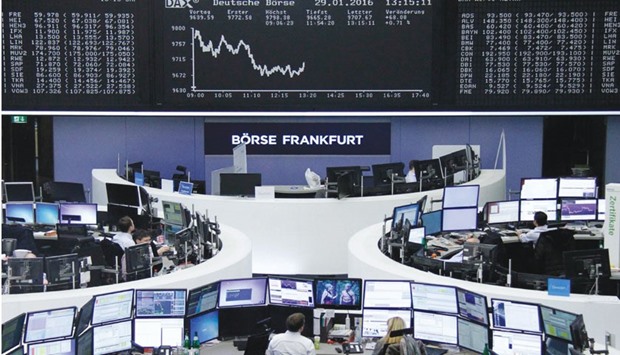Stock markets around the world rebounded yesterday, ending a highly volatile month with a bang after the Bank of Japan unexpectedly slashed interest rates into negative territory for the first time.
In Europe, both London and Paris closed with gains above 2.2% at 6,059.50 points and 4,417.02 points respectively. In Frankfurt, the DAX 30 was up 1.6% at 9,798.11 points at close.
Wall Street also pushed higher yesterday despite data showing the US economy slowed sharply in the fourth quarter of last year to a 0.7% annual rate, down from 2.0% in the third quarter.
The Dow Jones Industrial Average was up 1.2% in midday trade.
But the BoJ’s move “is really a tacit admission that the outlook stinks,” said Briefing.com analyst Patrick O’Hare.
And it is the poor outlook that led markets worldwide enduring a brutal start to 2016, despite yesterday’s rebound.
US markets are in line to end January with considerable losses, with the Dow down over 6% for the month, and the tech-heavy NASDAQ Composite around 9% lower.
Equities US rallied as traders seized on the BoJ’s announcement that it would charge banks to hold their cash, in news that also sent the yen tumbling.
The Bank of Japan’s unprecedented decision to adopt a below-zero interest rate mirrors the European Central Bank (ECB) and the Swiss National Bank (SNB) — which both first unveiled negative rates in 2014.
The policy is the BoJ’s latest weapon to spur lending and is part of its long-running fight against anaemic economic growth and deflation. After the news Tokyo’s Nikkei stock index soared and the yen plunged.
The -0.1 deposit rate aims to give Japanese banks an incentive to boost lending, which in turn should help fuel economic growth.
Policymakers hope that putting more cash in shoppers’ wallets will spur spending and move Japan closer to the bank’s 2.0% inflation goal.
Lower interest rates tend to be positive for stock markets because they make equities a more attractive asset for investors, while boosting liquidity and hopes of economic growth.
Trading floors across the world have been awash with red in January as investors endured one of the worst starts to a year in recent history, with markets hit by China’s bumpy economic slowdown, weak global growth and crashing oil prices.
The BoJ also warned yesterday over the negative impact of the economic crisis gripping key trading partner China — a crucial driver of global growth — and said it was prepared to cut rates further below -0.1% “as necessary”.

Traders work at the stock exchange in Frankfurt. The DAX 30 was up 1.6% at 9,798.11 points at close yesterday.
